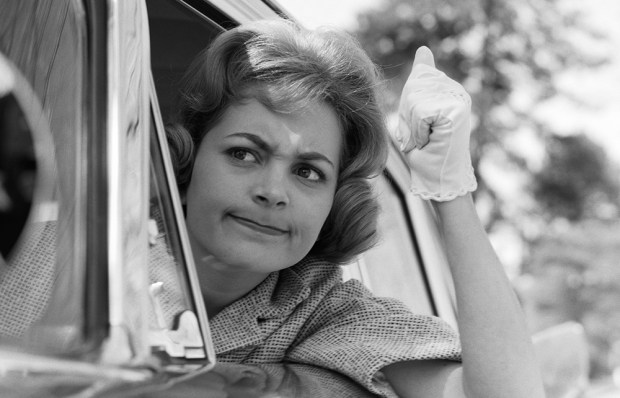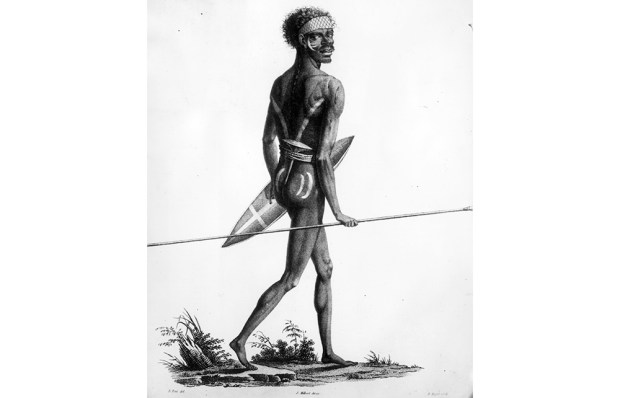I’m in a nursing home. It’s St Vincent’s, Australia’s biggest not-for-profit aged care provider, one of several in Brisbane run by the Sisters of Charity. The setting is picturesque on the river, alive with CityCat ferries and a skyline dominated by towering apartment blocks. I’m in my ninetieth year and the plan was that I would be here for a few weeks’ respite while my wife of 56 years recovered from unexpected major surgery. But there were complications which are continuing and those few weeks have stretched to almost a year.
The time in a nursing home has been many things, first and foremost a revelation. It’s taken me, a journalist who has lived and reported on three continents, all this time to learn about the many sides of humanity: life and death, heroism, compassion, forbearance. Death happens often here, on average almost once a month. While there’s passing sadness, life briefly celebrated in the beautiful chapel, stoic acceptance prevails. Life goes on.
Phyllis, by modern standards, at 82 was not old. She was a former Queensland cop at a time when women weren’t all that common in Australian police forces. I knew her only through the chapel, sitting next to me at the thrice-weekly Masses. She spent most of the service gently napping in her chair and the eucharistic minister had to wake her to receive communion. She also woke briefly to take my hand at the sign of peace. Then one morning her seat was empty.
Earlier, there was Pauline, bright and alert at 100, who turned up in a Broncos’ jersey to welcome notables from the club who celebrated with her birthday cake and delighted her with a signed football. Each morning, she took her place unaided at breakfast and chatted animatedly with her many friends around the table. Overnight she disappeared. A candle burns in the home’s foyer, names on a chapel patchwork quilt for the Paulines, Phyllises and the many others whose presence simply fades from sight.
I’m impressed by that stoicism and courage of all those around me. Many find it hard to express themselves, even to form a word or two, perhaps the after-effects of a stroke. Yet, speechless, they love to join – to listen – in our weekly discussion group which avoids heavy issues like Gaza and Ukraine and dwells more on participants’ full and rich lives. Most residents have walkers, lined up in long, straight rows in the recreation room corridor for activities like the choir or bingo. I can’t help thinking of those old Westerns where horses are tied up to a hitching rail.
The choir participants may not qualify for Eurovision, but their enthusiasm is boundless with numbers like ‘Over the Rainbow’ and ‘I Still Call Australia Home’. I never cease to wonder, too, how so many of those who are on walkers or in wheelchairs, some reclined under rugs, bear discomfort and pain without complaint. Their courage is palpable. One lady, a non-journalist and wheelchair-confined, produces each month a highly readable newsletter. I think of another resident on a stick I met in the corridor, a dressing across her right eye; whogreeted me cheerfully and said she was on the way to gym. No one whinges here.
Compassion around me is so consistent that it has to be genuine. Staff have the words ‘Be kind’ stamped on tee-shirts; it’s part of the ethos of the place. I’ve lost count of the number of nationalities among nurses and other staff: China – one smiling, young female adopted, appropriately, Summer as her given English name – to Colombia, Bhutan, Uganda and Nepal, Mauritius, South Korea and Papua New Guinea to Australia.
St Vincent’s doesn’t fit the negative stereotype of many nursing homes, but it does have one thing in common: few visits by out-of-sight, out-of-mind families. It’s rare to see parents, siblings, grandchildren. I’m fortunate to have two caring sons, daughters-in-law andgranddaughters and am still capable of going home occasionally. All of us rejoice in visits by schoolchildren and the odd pet.
I spend much time writing and contributing to newspapers. I’ve also completed my first novel. As a non-celebrity, I’m trying to cope with the negativity and at times downright rudeness from publishers. But persevere. I’m encouraged in the authorship stakes by a well-stocked library, including bestsellers. I found the most gripping read by a pope, John Paul II’s Crossing the threshold of hope. While it’s translated, the writing is razor-sharp and reflects Pope John Paul’s deep humanity and awareness of contemporary issues.
He describe Jews as ‘our elder brothers in the faith’ and anti-Semitism ‘a great sin against humanity’. My wife and I were presented to him in the Vatican’s Audience Hall before a crowd of thousands. He was fragile from Parkinson’s, his insides full of plastic from an assassin’s bullet, and shuffled painfully on a stick across the stage. He chose the passage from John xvi 28: ‘…I am leaving the world and going to the Father’. A Jesuit observer predicted he would be dead in weeks. but he went on for another year and is now recognised as a saint.
Got something to add? Join the discussion and comment below.
John Coleman is a veteran journalist who has worked in Australia, London’s Fleet Street and the US.
You might disagree with half of it, but you’ll enjoy reading all of it. Try your first month for free, then just $2 a week for the remainder of your first year.













